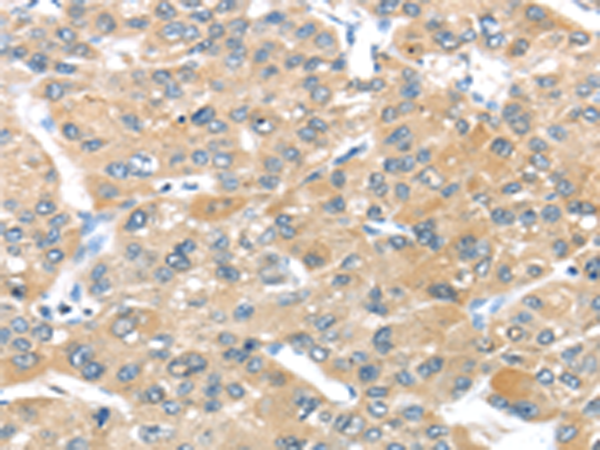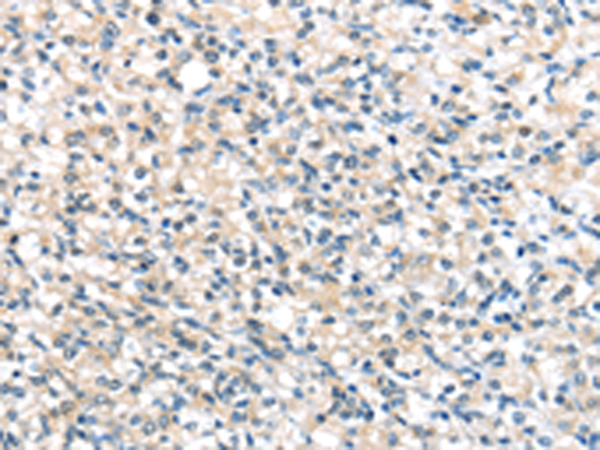


| WB | 咨询技术 | Human,Mouse,Rat |
| IF | 咨询技术 | Human,Mouse,Rat |
| IHC | 1/10-1/50 | Human,Mouse,Rat |
| ICC | 技术咨询 | Human,Mouse,Rat |
| FCM | 咨询技术 | Human,Mouse,Rat |
| Elisa | 1/1000-1/2000 | Human,Mouse,Rat |
| Aliases | SLC25A9 |
| WB Predicted band size | 34 kDa |
| Host/Isotype | Rabbit IgG |
| Antibody Type | Primary antibody |
| Storage | Store at 4°C short term. Aliquot and store at -20°C long term. Avoid freeze/thaw cycles. |
| Species Reactivity | Human, Mouse, Rat |
| Immunogen | Synthetic peptide of human UCP3 |
| Formulation | Purified antibody in PBS with 0.05% sodium azide and 50% glycerol. |
+ +
以下是3篇涉及UCP3抗体的研究文献及其摘要内容的简要概括:
---
1. **文献名称**: "Mitochondrial uncoupling protein 3 (UCP3): Role in energy expenditure and obesity"
**作者**: Vidal-Puig, A.J. et al.
**摘要**: 研究通过Western blot和免疫组化技术,利用特异性UCP3抗体探究了其在骨骼肌中的表达与能量代谢的关系,发现UCP3表达水平与肥胖模型中的能量消耗调控相关。
2. **文献名称**: "Characterization of UCP3 in human skeletal muscle: Antibody validation and functional implications"
**作者**: Schrauwen, P. et al.
**摘要**: 文章验证了多种UCP3抗体的特异性,比较了不同物种(人类、小鼠)中的交叉反应性,并发现UCP3在脂肪酸代谢中的作用可能通过线粒体膜电位变化实现。
3. **文献名称**: "UCP3 ablation increases mitochondrial proton leak and insulin resistance in skeletal muscle"
**作者**: Choi, C.S. et al.
**摘要**: 通过基因敲除小鼠模型结合UCP3抗体检测,发现UCP3缺失导致线粒体质子漏减少,进而引发骨骼肌胰岛素抵抗,提示其在代谢疾病中的潜在机制。
---
以上文献均聚焦于UCP3的功能验证、抗体应用及代谢调控机制,可作为相关研究的参考。如需具体期刊信息或年份,可进一步补充关键词进行检索。
The UCP3 (Uncoupling Protein 3) antibody is a crucial tool for studying the role of UCP3. a mitochondrial membrane protein primarily expressed in skeletal muscle and brown adipose tissue. UCP3 belongs to the uncoupling protein family, which regulates energy metabolism by dissipating the proton gradient across the mitochondrial inner membrane, thereby reducing ATP synthesis and generating heat. While its exact physiological role remains debated, UCP3 is implicated in fatty acid metabolism, thermogenesis, and protection against oxidative stress by modulating reactive oxygen species (ROS) production.
UCP3 antibodies are widely used in research to detect and quantify UCP3 expression in tissues or cells via techniques like Western blotting, immunohistochemistry, and immunofluorescence. These antibodies help investigate UCP3's involvement in metabolic disorders, such as obesity, diabetes, and mitochondrial dysfunction. Studies also explore UCP3's response to physiological stimuli (e.g., exercise, fasting) or pathological conditions (e.g., insulin resistance).
High-quality UCP3 antibodies are validated for specificity, often through knockout controls, to ensure accurate detection of the ~34 kDa protein. Researchers rely on these tools to clarify UCP3's regulatory mechanisms, including transcriptional control by PPARs (peroxisome proliferator-activated receptors) and post-translational modifications. Ongoing research aims to link UCP3 polymorphisms or altered expression to human metabolic diseases, highlighting its potential as a therapeutic target.
×